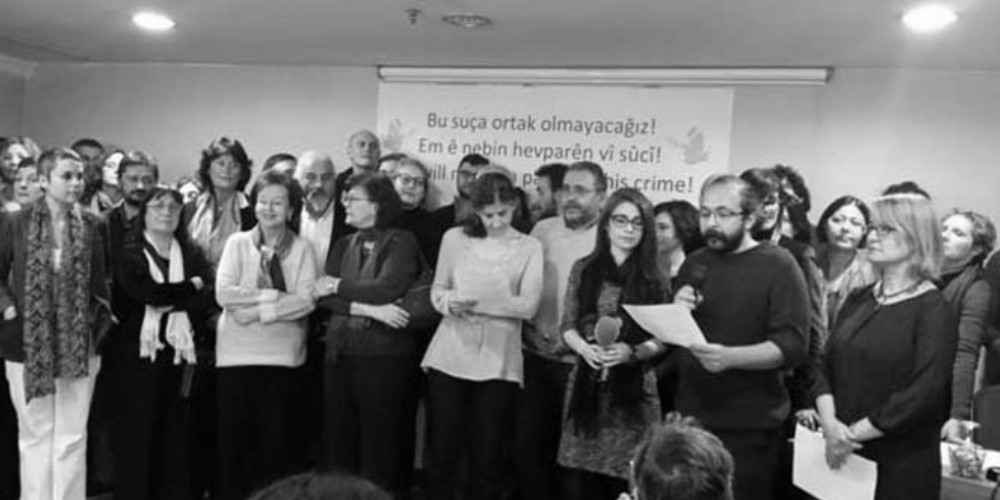London Academics Extend Solidarity to Academics, Kurds Under Siege

Mel Plant, BA Arabic and Turkish
This Friday, SOAS Students’ Union co-hosted an open meeting with the SOAS UCU and Unison branches, extending solidarity to Turkish and Kurdish academics in Turkey who have come under investigation for their ‘Academics for Peace‘ petition. The meeting comes a week after the Students’ Union released a statement in support of the petition.
The petition, launched on January 10th with 1128 original signatures from academics in Turkey and around the globe, criticizes the Turkish state for its apparent ‘deliberate and planned massacre’ against Kurdish citizens. Academics from 89 Turkish universities were joined by 355 international academics, including Judith Butler and Noam Chomsky, to condemn the Turkish government by saying ‘we will not be a party to this crime.’ The petition closed on January 20th with an increased figure of 2212 signatures from Turkey and 2279 from academics abroad.
On Friday, Kerem Nisancioglu (SOAS), Ceylan Begum Yildiz (KCL/Birkbeck) and Latif Tas (SOAS), all three original signatories to the petition, were joined by Nadje al-Ali (SOAS) to discuss the wider context of Turkish state violence towards Kurds, its crackdown on academic and press freedoms, and what the SOAS community can do to aid academics now coming under fire in Turkey.
Most of the original 1128 signatories have come under investigation by the state, and in many cases, by their universities, for supposedly ‘propagandising for a terrorist organisation,’ and violating Article 301 of the Turkish Constitution which prohibits denigrating ‘Turkishness,’ the Turkish Republic, and its institutions. Yildiz pointed out that ‘Turkish is a bit of a problematic concept,’ a comment which resonated with many in the room. Article 301 has been used to prosecute many in the past, including Turkish authors Orhan Pamuk and Elif Safak, with the concept of ‘Turkishness’ being left vague for the government to interpret to its will.
Yildiz highlighted that Turkish academics abroad, such as herself, are also in danger of prosecution by the state. Turkish citizens abroad are now in fear of losing their state funding because of their support for the petition. If prosecution were successful, academics could be forced back to Turkey and/or to repay their student loan debts immediately, as well as having their funding revoked.
This harsh prospect for Turkish academics abroad prompted the suggestion that SOAS Students’ Union, in collaboration with UCU and Unison, should create a support fund for academics in case their funding is cut. An audience member criticised the suggestion, saying that even with support funding, victimised academics’ families would be forced to pay back their funding to the Turkish government as they act as guarantors.
Nisancioglu suggested that SOAS and other universities should go further than offering support funds for Turkish academics studying abroad by also offering scholarships and visiting fellowships for students and academics who are in immediate danger and need to leave the Turkish state. Tas noted that not only academic freedom is in danger in Turkey – rather ‘all freedoms’ are under fire.
Speaking from his experience as a journalist in Turkey during the 1990s and 2000s, Tas said that the current situation of Kurdish towns and cities under siege by the Turkish stare ‘reminded [him] of 1991.’ The early 1990s are widely regarded as a period of civil war in Turkey and Kurdistan, and the current situation of crackdowns on the press and police and army killings of Kurdish civilians hark back to this era.
Al-Ali, a prominent SOAS academic who has already spoken out against the Turkish government’s crackdown on signatories, contrasted the state prosecution’s claim that ‘Academics for Peace’ are ‘propagandising for a terrorist organisation’ by saying that ‘we know the Turkish government is… in different ways helping ISIS.’ In recent months, the pro-Kurdish HDP has seen a breakdown in communications with the ruling AKP, which equally accuses them of colluding with ‘terrorists’ (the PKK). Al-Ali instead praised the HDP as ‘probably the most progressive political movement there is right now.’
The academics present at the meeting, alongside audience members, called on the UK government and the EU to take a stronger stance, with some crediting EU member states’ current ‘soft’ stance on Turkey’s siege on Kurdish civilians on the 3 billion euro EU-Turkey deal to stem the flow of refugees.
SOAS’ Unison branch representative, Sandy Nicoll, suggested that SOAS should question its relationships with Turkish universities, perhaps considering boycott if a university was punishing its academics for signing the petition. Currently, SOAS runs a Turkish year abroad programme and an Erasmus scheme with Bogazici University in Istanbul. As of yet, no action has been taken by Bogazici against academic signatories at the university. A full list of universities which have taken action against academics can be found here.
Suggestions of a boycott against Turkish universities led to comparisons with the Boycott, Divestment and Sanctions (BDS) movement and the motion for an academic boycott of Israel which was passed by a student and staff-wide referendum last year. However, an audience member criticised the concept of an academic boycott within the Turkish context, saying that a boycott (especially if it was not called for by Kurdish activists within Turkey, as is the case with the Palestinian BDS movement) would only punish students and staff in Turkish academic institutions.
As of yet, SOAS Students’ Union, UCU and Unison have yet to come to a decision on how to effectively aid Turkish and Kurdish academics under fire. Yildiz urged the audience to follow the ‘Academics for Peace’ page in order to receive further information, which could include a potential boycott.
For further information and perspectives on the petition from signatories within Turkey, please see Agos’ article here.
For further information on the current state of sieges in Kurdistan, Yildiz advised the audience to follow Bakur Revolt and the Human Rights Foundation of Turkey on Twitter (both of which release infographics in English and Turkish).





